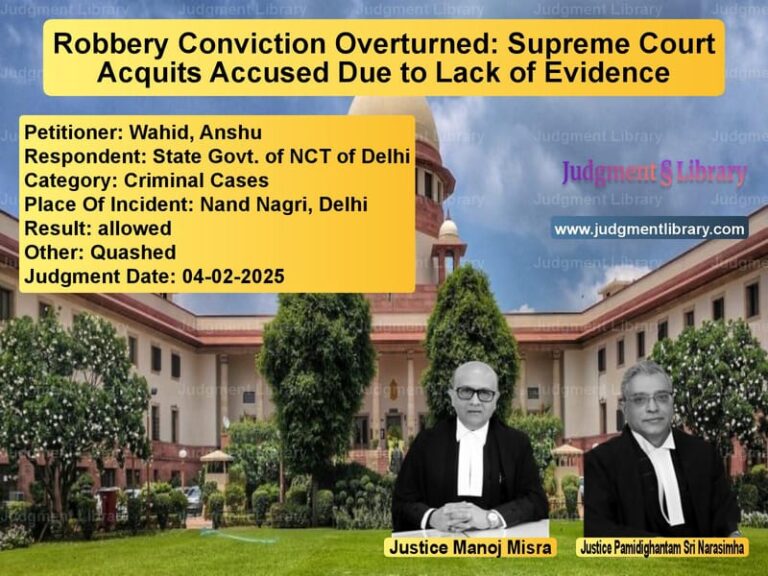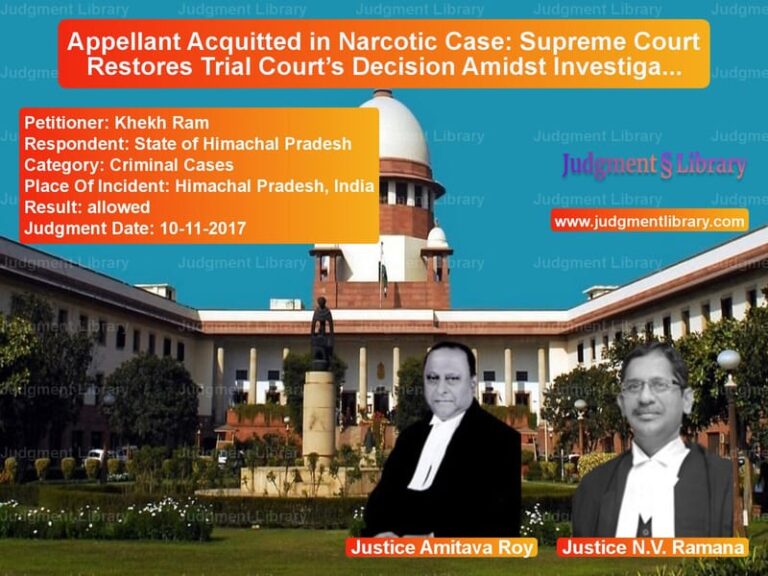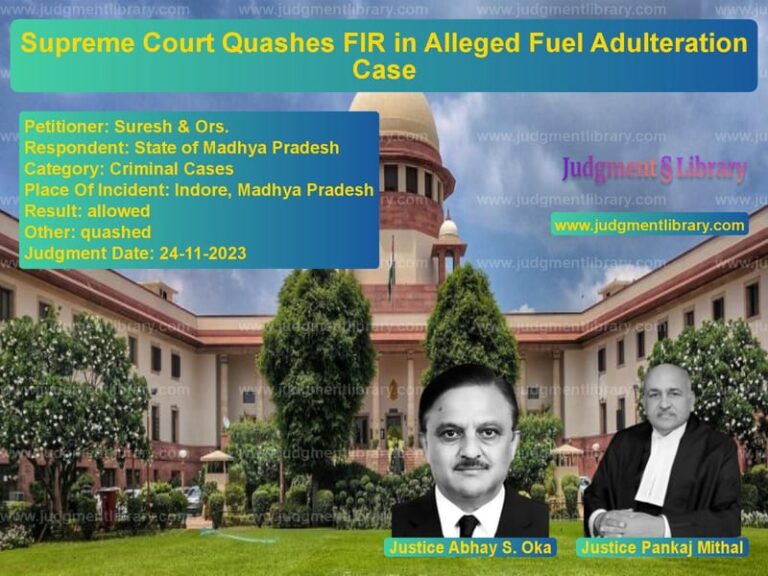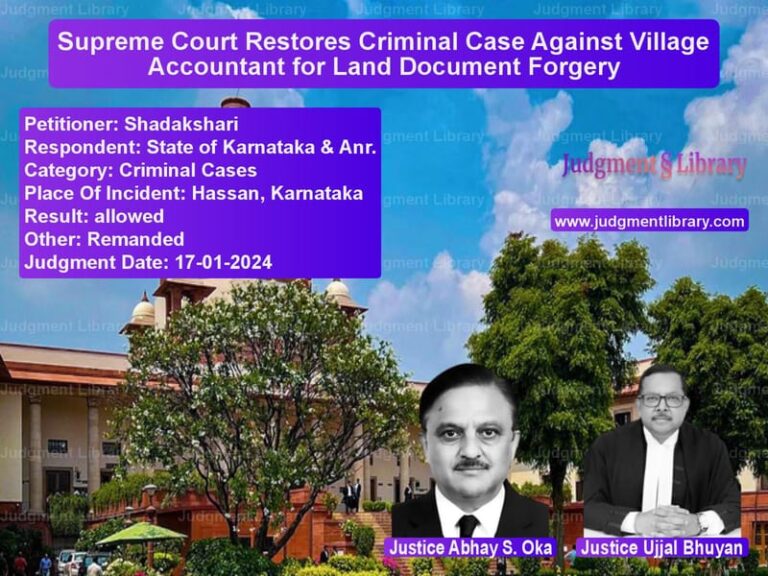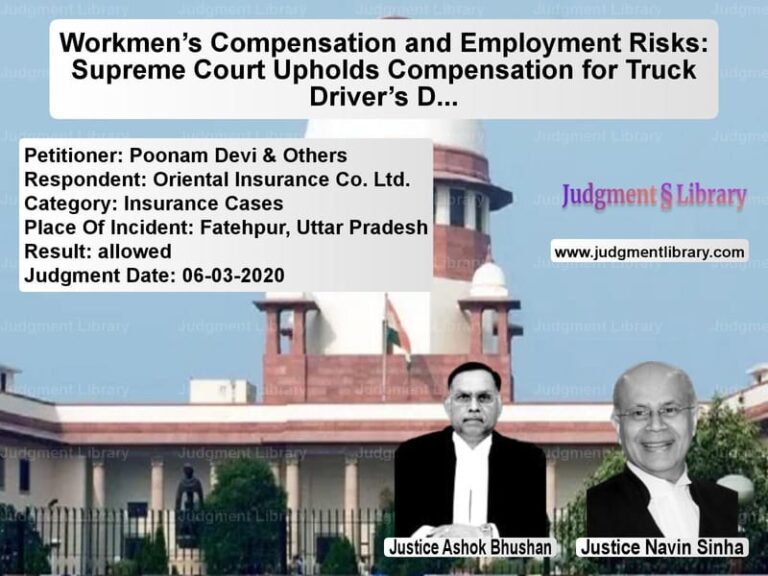Arbitration Awards and Judicial Review: Konkan Railway vs. Chenab Bridge Project Undertaking
The case of Konkan Railway Corporation Limited v. Chenab Bridge Project Undertaking is a significant Supreme Court judgment that addresses the scope of judicial review under the Arbitration and Conciliation Act, 1996. The dispute arose over tax reimbursements in a construction contract, and the legal question was whether an arbitral tribunal’s interpretation of contractual terms could be overturned by a court exercising appellate jurisdiction.
This case highlights the legal principles governing arbitration awards, the limits of judicial interference under Sections 34 and 37 of the Arbitration Act, and the importance of maintaining party autonomy in dispute resolution.
Background of the Case
Konkan Railway Corporation Limited (hereinafter ‘Appellant’) awarded a contract to Chenab Bridge Project Undertaking (hereinafter ‘Respondent’) for the construction of a bridge on the Katra-Laole section of the Udhampur-Srinagar-Baramulla rail link, which is considered the world’s highest railway bridge. The contract was executed on November 24, 2004.
During the execution of the contract, disputes arose regarding the reimbursement of two specific taxes:
- Entry Tax: The Jammu and Kashmir government had initially exempted entry tax on earth-moving equipment through a notification dated December 19, 2003. However, this exemption was later withdrawn on January 25, 2008, leading to an additional tax burden of Rs. 1,32,29,771/- for the Respondent.
- Toll Tax: At the time of the contract’s execution, toll tax was Rs. 400 per metric ton. Through successive notifications under the Jammu and Kashmir Levy of Toll Tax Act, 1998, the tax rate was increased to Rs. 650 per metric ton, imposing an additional cost of Rs. 5,23,279/- on the Respondent.
The Respondent sought reimbursement of these amounts, citing contractual clauses that provided for adjustments in case of tax increases. The matter was referred to arbitration, and the arbitral tribunal delivered its award on November 15, 2014, rejecting the Respondent’s claims.
Key Legal Issues
- Did the Arbitral Tribunal correctly interpret the contractual clauses regarding tax reimbursements?
- Could the High Court, in exercising jurisdiction under Sections 34 and 37 of the Arbitration Act, overturn the findings of the Arbitral Tribunal?
- What is the scope of judicial interference in arbitration awards?
Arbitral Tribunal’s Decision
The tribunal ruled against the Respondent, holding that:
- Clause 5.1.2 of the contract covered only direct taxes levied on invoices raised by the contractor on the employer and not taxes embedded in the cost of materials or equipment.
- Entry tax on earth-moving equipment and increased toll tax were included in the original contract price and could not be separately reimbursed.
- Clause 7.1.1 stated that the rates quoted by the contractor would remain unchanged for the contract duration, and price variations would only be addressed through the price variation formula.
- Clause 11.7 confirmed that all taxes and duties were included in the contract price and no additional claims were admissible.
Therefore, the tribunal concluded that the Respondent was not entitled to any additional reimbursement.
Proceedings Before the High Court
The Respondent challenged the arbitral award before the Bombay High Court under Section 34 of the Arbitration and Conciliation Act, which allows courts to set aside awards on limited grounds, such as procedural unfairness or manifest arbitrariness.
Read also: https://judgmentlibrary.com/supreme-court-rejects-review-petition-in-foreign-arbitration-award-case/
The Single Judge of the High Court dismissed the challenge, affirming that:
- The tribunal’s interpretation of the contract was reasonable and fell within its jurisdiction.
- There were two possible interpretations of the tax clauses, and the tribunal had chosen one that was legally plausible.
- Under Section 34, courts could not interfere with an award merely because they disagreed with the tribunal’s reasoning.
Dissatisfied, the Respondent filed an appeal under Section 37 before the Division Bench of the High Court, which reversed the Single Judge’s decision. The Division Bench held that:
- The tribunal’s interpretation was perverse and rendered Clause 5.1.2 meaningless.
- Clause 5.1.2 included indirect taxes such as entry tax and toll tax, and reimbursement for these taxes was contractually mandated.
- The tribunal’s failure to consider these aspects justified judicial intervention.
The Appellant then approached the Supreme Court, arguing that the Division Bench had exceeded its jurisdiction by interfering with the tribunal’s findings.
Supreme Court’s Ruling
The Supreme Court ruled in favor of the Appellant, reinstating the arbitral award and the Single Judge’s order. The Court emphasized the following principles:
- Limited Scope of Judicial Review: Under Sections 34 and 37, courts cannot reappreciate evidence or interfere with an arbitral award unless it is patently illegal or perverse.
- Tribunal’s Interpretation Must Be Respected: If an arbitral tribunal adopts a plausible interpretation of a contract, courts should not substitute their own view.
- Finality of Arbitral Awards: The Arbitration Act aims to minimize judicial intervention, ensuring that arbitration remains an effective alternative to litigation.
- Reliance on Precedents: The Court cited cases such as Associate Builders v. Delhi Development Authority and MMTC Ltd. v. Vedanta Ltd. to reinforce the principle that arbitral decisions should not be overturned lightly.
The Court held:
“The Division Bench of the High Court committed an error in setting aside the concurrent findings of the Arbitral Tribunal and the Single Judge of the High Court. The Award of the Arbitral Tribunal and the decision of the Single Judge under Section 34 cannot be termed as perverse or patently illegal. The Division Bench should not have interfered with these orders.”
Accordingly, the Supreme Court allowed the appeal and reinstated the arbitral award.
Impact of the Judgment
The ruling reinforces the principles of arbitration law in India:
- Courts must respect the autonomy of arbitral tribunals.
- Judicial intervention in arbitral awards should be minimal.
- Parties to commercial contracts should have confidence that arbitration will lead to final resolution of disputes.
This decision will serve as a precedent in future cases where courts are called upon to review arbitral awards, reaffirming the pro-arbitration stance of Indian jurisprudence.
Petitioner Name: Konkan Railway Corporation Limited.Respondent Name: Chenab Bridge Project Undertaking.Judgment By: Justice Dhananjaya Y Chandrachud, Justice Pamidighantam Sri Narasimha, Justice J.B. Pardiwala.Place Of Incident: Jammu and Kashmir.Judgment Date: 17-08-2023.
Don’t miss out on the full details! Download the complete judgment in PDF format below and gain valuable insights instantly!
Download Judgment: konkan-railway-corpo-vs-chenab-bridge-projec-supreme-court-of-india-judgment-dated-17-08-2023.pdf
Directly Download Judgment: Directly download this Judgment
See all petitions in Arbitration Awards
See all petitions in Dispute Resolution Mechanisms
See all petitions in Arbitration Act
See all petitions in Enforcement of Awards
See all petitions in Judgment by Dhananjaya Y Chandrachud
See all petitions in Judgment by P.S. Narasimha
See all petitions in Judgment by J.B. Pardiwala
See all petitions in allowed
See all petitions in supreme court of India judgments August 2023
See all petitions in 2023 judgments
See all posts in Arbitration and Alternate Dispute Resolution Category
See all allowed petitions in Arbitration and Alternate Dispute Resolution Category
See all Dismissed petitions in Arbitration and Alternate Dispute Resolution Category
See all partially allowed petitions in Arbitration and Alternate Dispute Resolution Category


